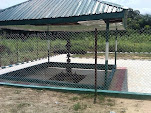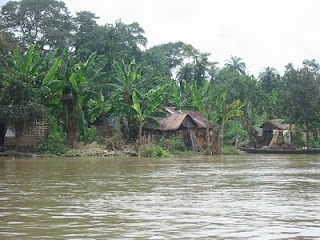Niger Delta Question and agitation
Ijaw ethnic nationality of the Niger Delta within the Nigerian state is scattered across six states -- Ondo, Edo, Delta, Bayelsa, Rivers and Akwa Ibom States. The Ijaws are a nation of more than fourteen million people in the Niger Delta region of Nigeria, the most populous indigenous inhabitants of the Niger Delta and constitute the fourth largest ethnicity within the borders of Nigeria.
Since the discovery of crude oil in commercial quantity in Oloibiri (Ijawland) in 1958, oil companies such as Shell (Anglo/Dutch), AGIP (Italian), Elf (French) and Chevron (American) have colluded with the military and successive governments of Nigeria in war of economic exploitation, environmental degradation, and of internal colonialism.
Nigeria is Africa's leading oil producer and the world's seventh largest exporter. Nearly all its 2.5 million barrels a day production comes from the Niger Delta and nearby offshore oilfields. Ijaws are the dominant tribe in the southern delta region, which accounts for nearly all of Nigeria's daily oil exports. Some members of the Ijaw ethnic group in the oil-producing Niger Delta region who seek greater local autonomy continued to commit serious abuses, including killings and kidnappings.
Organizations like the Movement for the Survival of Ogoni People (MOSOP), the Movement for the Survival of Ijaw Ethnic Nationality (MOSIEN), and Ijaw Youth Council have been at the fore of popular mobilization in the Niger Delta. Since the implosion of MOSOP, Ijaw youths have increasingly taken center stage. Ijaw youth groups are leading a struggle for the right to share their land's oil wealth. They have organized into groups, the most daring being the Egbesu Boys of Bayelsa, the Chicoco Movement, the Ijaw Youth Council, Federated Niger Delta Ijaw communities and the Niger Delta Volunteer Force. Several splinter groups have turned to extortion, hijacking, sabotage and kidnapping for private gain. Many of the Ijaw youths who are fighting are also idlers for whom violence has become a source of daily entertainment.
The Ijaw National Congress is involved in the struggle to achieve cultural change and free the people of the Niger Delta, and the Ijaws in particular from decades of environmental pollution, corporate violence, unjust socio-economic structure and political oppression
The Egbesu Boys and the other Ijaw youths who are sabotaging oil installations issued an ultimatum called Kaiama Declaration on December 11, 1998. The Ijaw Youth Congress demanded the immediate withdrawal from Ijawland of all military forces of occupation and repression by the Nigerian State. Any oil company that employs the services of the armed forces of the Nigerian State to "protect" its operations will be viewed as an enemy of the Ijaw people. It has expressed solidarity with other peoples organisations and ethnic nationalities in Nigeria who are struggling for self-determination and justice, notably the Oodua Peoples Congress (OPC), the Movement for the Survival of Ogoni People (Mosop), and the Egi Women's Movement.
Police and military personnel used excessive and sometimes deadly force in the suppression of civil unrest and interethnic violence, primarily in the oil and gas regions of the country, where there has been an upsurge in confrontations between increasingly militant youths, oil companies, and government authorities. For example, in December 1998, about 4,000 Ijaw activists met and issued the "Kaiama Declaration," which demanded that all government armed forces withdraw from Ijaw areas, that oil companies stop all production by December 30, and emphasized that the Delta region belonged to the Ijaw. In response to a perceived threat, the Government deployed additional armed forces to Bayelsa State and declared a state of emergency there. The state of emergency was lifted on January 4, 1999. At least 20 Ijaw died in the clashes between Ijaw youth protesters and military troops in Yenagoa, Bayelsea State between December 30 and January 4. On January 4, soldiers killed at least four civilians in Delta State in the Niger Delta region after attacks on oil production facilities by members of the surrounding communities. On January 6, the military commandeered privately owned helicopters that normally are leased to foreign oil companies and used these helicopters to quell community protests in two Ijaw villages in Delta State by allegedly firing indiscriminately at villagers from the helicopters. Official figures indicate that security forces killed approximately 35 persons before the state of emergency protests in Bayelsa and Delta States ended on January 10; there were some reports of higher figures. No one has been held accountable.
Disgruntled military officers, serving and retired are said to be providing the growing 'private armies' with sophisticated weapons, which seriously threaten the country's budding democracy.
Moujahid Dokubo-Asari, who heads the Niger Delta People's Volunteer Force, is seen as a folk hero by many poor residents who complain they've never shared in the country's oil wealth. Dokubo-Asari claims to be fighting for self-determination in the region and greater control over oil resources for more than 8 million Ijaws. The NDPVF says it is seeking a better deal for the Ijaw people, the largest tribe in the Niger Delta which accounts for most of Nigeria's oil production. But the government says it is nothing more than a criminal gang which finances itself by stealing oil from pipelines and selling it clandestinely to tankers offshore.
The NDPVF vowed to begin a new offensive on 1 October 2004, dubbed "Operation Locust Feast." It said this would target oil workers unless multinational companies pumping oil in the Niger Delta shut down production. However, the group said it would not try to damage the oil installations themselves. After the militants' declaration of war, international oil prices on Tuesday shot up to more than US $50 a barrel for the first time ever as traders worried about supplies from Nigeria.
Dokubo-Asari said his armed rebellion would be called off if agreement were reached with the government on his group's key demands. These are greater autonomy for the Niger Delta and more control over the region's oil wealth for the people who live there.
ASARI DUKUBO Niger Delta People's Volunteer Force
The Niger Delta People's Volunteer Force one of the largest armed groups in the Niger Delta region of Nigeria and is composed primarily of members of the region's largest ethnic group, the Ijaw. The group was founded in 2004 in an attempt to gain more control over the region's vast petroleum resources, particularly in Delta State. The NDPVF has frequently demanded a greater share of the oil wealth from both the state and federal government and has occasionally supported independence for the Delta region. Founding and initial conflict
The NDPVF's strongly Ijaw agenda has led to conflict with both the Nigerian state and federal governments, as well as with neighboring ethnic groups, notably long-time rival the Itsekiri. . This rivalry precipitated a number of conflicts in the region, centered primarily around the cities of Warri and subsequently the 'oil capital' of Port Harcourt. The issue of local government ward allocation has proven particularly contentious, as the Ijaw feel that the way in which wards have been allocated ensures that their superior numbers will not be reflected in the number of wards controlled by politicians of Ijaw ethnicity. Control of the city of Warri, the largest metropolitan area in Delta State and therefore a prime source of political patronage, has been an issue ,especially fiercely contested prize. This has given birth to heated disputes between the Ijaw, the Itsekiri and the Urhobo about which of the three groups are "truly" indigenous to the Warri region, with the underlying presumption being that the "real" indigenes should have control of the levers of power, regardless of the fact that all three groups enjoy ostensibly equal political rights in their places of residence.Prior to 2003, the center of regional violence was Warri. However, after the violent convergence of NDPVF with the Niger Delta Vigilante (NDV) led by Ateke Tom (the NDV is also comprised primarily of Ijaws), conflict became focused on Port Harcourt and outlying towns. The two groups dwarf a plethora of smaller militias supposedly numbering more than one hundred. All of the groups are constituted mostly by disaffected young men from Warri, Port Harcourt, and their sub-urban areas. Although the smaller groups are autonomous from within, they have formed alliances with and are largely controlled from above by either Asari and his NDPVF or Tom's NDV who provided military support and instruction.
The NDPFV attempted control such resources primarily through oil "bunkering", a process in which an oil pipeline is tapped and the oil extracted onto a barge. Bunkering is illegal in the eyes of both the Nigerian state and the oil corporations, but is justified by the militias on the basis that they are being exploited and have not received adequate profits from the monstrously profitable but ecologically destructive oil industry. Bunkered oil can still however be sold for profit, usually to destinations in West Africa, but also abroad. Bunkering is a fairly common practice in the Delta but in this case the militia groups are the primary 'perpetrators'.[1].
The intense confrontation between the NDPVF and NDV seems to have been brought about by Asari’s political falling out with the NDPVF’s financial supporter Peter Odili, governor of Rivers State following the April 2003 local and state elections. After Asari publicly criticized the election process as fraudulent, the Odili government withdrew its financial support from the NDPVF and began to support Tom’s NDV, effectively launching a paramilitary campaign against the NDPVF.
These group have a be granted amnesty by the government of federal republic of Nigeria, now are the politicians who used the government fund to finance these groups being persecuted, watch out for the 2011 elections in the Niger Delta region.











No comments:
Post a Comment